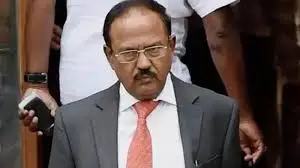India, Pakistan NSAs in touch, ‘doesn’t mean being in talks’, says official

Recent developments have once again highlighted the complicated relationship between India and Pakistan, particularly regarding their National Security Advisors (NSAs). Reports have surfaced indicating that the two NSAs have communicated, but Indian officials have quickly clarified that these exchanges are not part of formal talks or a resumption of diplomatic negotiations. The clarification comes amid rising concerns over regional security, with both countries facing multiple challenges, including border tensions and terrorism threats.
While backchannel communications between the two countries are not new, officials insist that these recent conversations are focused on specific security concerns. They do not signal a broader diplomatic effort. The primary goal seems to be preventing further escalation, particularly in volatile regions like Jammu and Kashmir. However, Indian officials are careful to emphasize that the current exchanges do not constitute formal peace talks.
The Nature of the Communication
The communication between the NSAs centers on addressing immediate security issues, particularly along the Line of Control (LoC) in Jammu and Kashmir. This area has long been a flashpoint for violence between India and Pakistan, with both sides regularly accusing each other of supporting militants. The LoC has seen numerous skirmishes and ceasefire violations in recent months, and both countries have expressed concerns over the possibility of further conflict.
Indian officials stress that these communications are limited to security matters and are not part of a larger diplomatic framework. While backchannel talks have been a consistent feature of India-Pakistan relations, especially during times of tension, they are seen as a means to manage immediate security concerns rather than advance broader peace negotiations.
The communications are seen as a way to maintain stability and prevent further escalation. Both India and Pakistan have nuclear capabilities, and military conflicts could have devastating consequences. Keeping open lines of communication between the two NSAs is viewed as a precautionary measure to avoid misunderstandings that could lead to larger-scale violence.
A History of Failed Dialogues
The current communication between the NSAs recalls a long history of broken dialogues and failed peace processes between India and Pakistan. The two countries have fought wars and engaged in numerous military confrontations over the decades. The Kashmir dispute has remained the central issue, contributing to periodic clashes and conflicts.
Despite several efforts at peace talks, progress has been elusive. The most recent diplomatic efforts collapsed after the 2016 Uri attack, which Indian officials blamed on Pakistan-based militants. Following the attack, India accused Pakistan of sponsoring terrorism, while Pakistan denied any involvement. This event led to the breakdown of the peace process, and relations between the two countries remained strained.
The lack of trust and history of failed agreements complicate the potential for progress. India has repeatedly called on Pakistan to take stronger action against militants operating from its territory. Conversely, Pakistan has raised concerns about India’s actions in Kashmir, especially after the revocation of Article 370 in 2019, which granted the region special status.
Given this history, many experts remain cautious about the potential for lasting peace. The trust deficit between the two countries remains wide, and any move toward reconciliation would require significant changes in the stance of both nations. For now, the focus appears to be on de-escalating tensions, rather than pursuing comprehensive peace talks.
Security Concerns at the Forefront
The rising security concerns in Jammu and Kashmir have contributed to the recent communication between the NSAs. In the past months, clashes along the LoC have increased, leading to civilian casualties and raising fears of further escalation. Both India and Pakistan have accused each other of violating ceasefire agreements, and the situation has become more unpredictable.
India has raised concerns about cross-border terrorism, alleging that Pakistan continues to support militants who target Indian security forces. Pakistani officials, on the other hand, have expressed concerns about the treatment of Muslims in Indian-administered Kashmir. The revocation of Article 370, they argue, has altered the region’s demographic makeup and violated international agreements.
Despite these ongoing tensions, both sides appear to be interested in preventing further escalation. The communication between the NSAs, although not part of formal peace talks, is seen as a necessary step to reduce tensions and avoid military confrontation.
The Path Forward
The future of India-Pakistan relations remains uncertain. While the communication between the NSAs may help prevent immediate crises, it does not indicate a major shift in the broader relationship. The core issues that have defined the conflict for over 70 years remain unresolved. Kashmir, terrorism, and military standoffs continue to dominate the agenda.
Both countries face internal pressures that complicate the prospect of meaningful dialogue. In India, the government’s position on Kashmir remains firm, and any compromise on the issue is politically difficult. In Pakistan, the military plays a central role in shaping foreign policy, and any dialogue with India is subject to military approval. This dynamic makes formal talks difficult and often derails attempts at peace.
Despite these obstacles, the communication between the NSAs highlights the importance of maintaining open lines of communication, even in times of tension. While formal peace talks may not be imminent, backchannel diplomacy may help manage conflicts and prevent an escalation of hostilities.
Conclusion
The recent communication between the National Security Advisors of India and Pakistan is an important, albeit limited, development in their relationship. While these exchanges focus primarily on security concerns, they do not signal the return of formal peace talks. The ongoing trust deficit, combined with unresolved issues such as the Kashmir dispute and cross-border terrorism, makes significant progress difficult.
For now, both countries are focused on preventing further violence, particularly along the Line of Control. While these informal exchanges may help de-escalate tensions, the larger issues that divide India and Pakistan remain unresolved. Any progress toward lasting peace will require sustained efforts, trust-building, and a willingness to address the core issues that have defined their relationship for decades.






